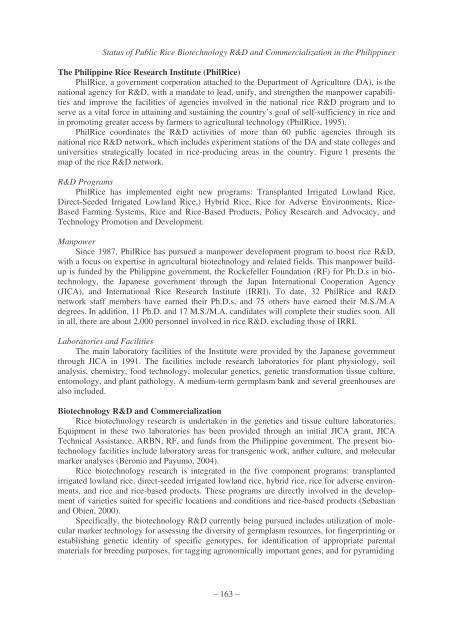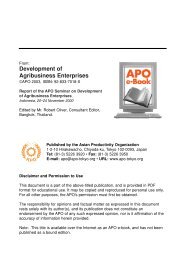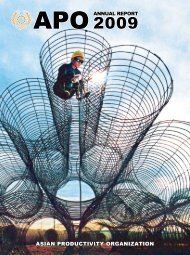Business Potential for Agricultural Biotechnology - Asian Productivity ...
Business Potential for Agricultural Biotechnology - Asian Productivity ...
Business Potential for Agricultural Biotechnology - Asian Productivity ...
You also want an ePaper? Increase the reach of your titles
YUMPU automatically turns print PDFs into web optimized ePapers that Google loves.
Status of Public Rice <strong>Biotechnology</strong> R&D and Commercialization in the Philippines<br />
The Philippine Rice Research Institute (PhilRice)<br />
PhilRice, a government corporation attached to the Department of Agriculture (DA), is the<br />
national agency <strong>for</strong> R&D, with a mandate to lead, unify, and strengthen the manpower capabilities<br />
and improve the facilities of agencies involved in the national rice R&D program and to<br />
serve as a vital <strong>for</strong>ce in attaining and sustaining the country’s goal of self-sufficiency in rice and<br />
in promoting greater access by farmers to agricultural technology (PhilRice, 1995).<br />
PhilRice coordinates the R&D activities of more than 60 public agencies through its<br />
national rice R&D network, which includes experiment stations of the DA and state colleges and<br />
universities strategically located in rice-producing areas in the country. Figure 1 presents the<br />
map of the rice R&D network.<br />
R&D Programs<br />
PhilRice has implemented eight new programs: Transplanted Irrigated Lowland Rice,<br />
Direct-Seeded Irrigated Lowland Rice,) Hybrid Rice, Rice <strong>for</strong> Adverse Environments, Rice-<br />
Based Farming Systems, Rice and Rice-Based Products, Policy Research and Advocacy, and<br />
Technology Promotion and Development.<br />
Manpower<br />
Since 1987, PhilRice has pursued a manpower development program to boost rice R&D,<br />
with a focus on expertise in agricultural biotechnology and related fields. This manpower buildup<br />
is funded by the Philippine government, the Rockefeller Foundation (RF) <strong>for</strong> Ph.D.s in biotechnology,<br />
the Japanese government through the Japan International Cooperation Agency<br />
(JICA), and International Rice Research Institute (IRRI). To date, 32 PhilRice and R&D<br />
network staff members have earned their Ph.D.s, and 75 others have earned their M.S./M.A<br />
degrees. In addition, 11 Ph.D. and 17 M.S./M.A. candidates will complete their studies soon. All<br />
in all, there are about 2,000 personnel involved in rice R&D, excluding those of IRRI.<br />
Laboratories and Facilities<br />
The main laboratory facilities of the Institute were provided by the Japanese government<br />
through JICA in 1991. The facilities include research laboratories <strong>for</strong> plant physiology, soil<br />
analysis, chemistry, food technology, molecular genetics, genetic trans<strong>for</strong>mation tissue culture,<br />
entomology, and plant pathology. A medium-term germplasm bank and several greenhouses are<br />
also included.<br />
<strong>Biotechnology</strong> R&D and Commercialization<br />
Rice biotechnology research is undertaken in the genetics and tissue culture laboratories.<br />
Equipment in these two laboratories has been provided through an initial JICA grant, JICA<br />
Technical Assistance, ARBN, RF, and funds from the Philippine government. The present biotechnology<br />
facilities include laboratory areas <strong>for</strong> transgenic work, anther culture, and molecular<br />
marker analyses (Beronio and Payumo, 2004).<br />
Rice biotechnology research is integrated in the five component programs: transplanted<br />
irrigated lowland rice, direct-seeded irrigated lowland rice, hybrid rice, rice <strong>for</strong> adverse environments,<br />
and rice and rice-based products. These programs are directly involved in the development<br />
of varieties suited <strong>for</strong> specific locations and conditions and rice-based products (Sebastian<br />
and Obien, 2000).<br />
Specifically, the biotechnology R&D currently being pursued includes utilization of molecular<br />
marker technology <strong>for</strong> assessing the diversity of germplasm resources, <strong>for</strong> fingerprinting or<br />
establishing genetic identity of specific genotypes, <strong>for</strong> identification of appropriate parental<br />
materials <strong>for</strong> breeding purposes, <strong>for</strong> tagging agronomically important genes, and <strong>for</strong> pyramiding<br />
– 163 –
















